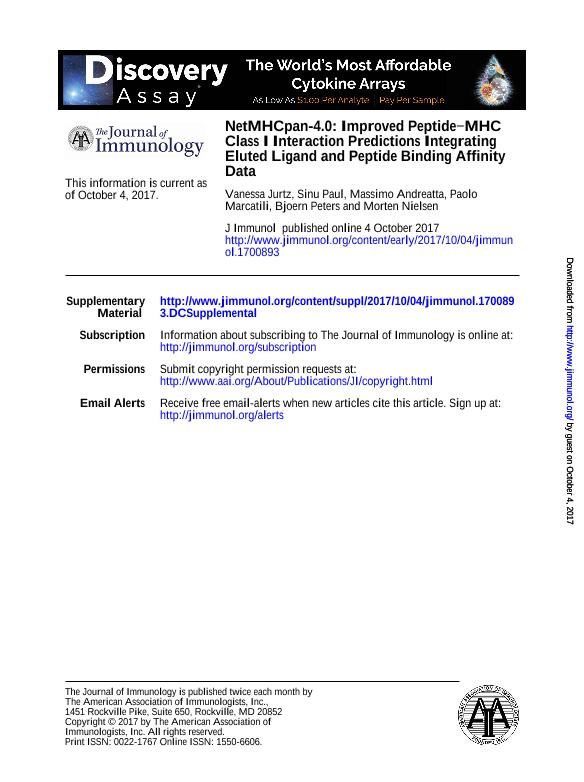Mostrar el registro sencillo del ítem
dc.contributor.author
Jurtz, Vanessa
dc.contributor.author
Paul, Sinu
dc.contributor.author
Andreatta, Massimo

dc.contributor.author
Marcatili, Paolo
dc.contributor.author
Peters, Bjoern

dc.contributor.author
Nielsen, Morten

dc.date.available
2018-06-14T14:48:34Z
dc.date.issued
2017-11
dc.identifier.citation
Jurtz, Vanessa; Paul, Sinu; Andreatta, Massimo; Marcatili, Paolo; Peters, Bjoern; et al.; Netmhcpan-4.0: Improved peptide-MHC class I interaction predictions integrating eluted ligand and peptide binding affinity data; American Association of Immunologists; Journal of Immunology; 199; 9; 11-2017; 3360-3368
dc.identifier.issn
0022-1767
dc.identifier.uri
http://hdl.handle.net/11336/48622
dc.description.abstract
Cytotoxic T cells are of central importance in the immune system's response to disease. They recognize defective cells by binding to peptides presented on the cell surface by MHC class I molecules. Peptide binding to MHC molecules is the single most selective step in the Ag-presentation pathway. Therefore, in the quest for T cell epitopes, the prediction of peptide binding to MHC molecules has attracted widespread attention. In the past, predictors of peptide-MHC interactions have primarily been trained on binding affinity data. Recently, an increasing number of MHC-presented peptides identified by mass spectrometry have been reported containing information about peptide-processing steps in the presentation pathway and the length distribution of naturally presented peptides. In this article, we present NetMHCpan-4.0, a method trained on binding affinity and eluted ligand data leveraging the information from both data types. Large-scale benchmarking of the method demonstrates an increase in predictive performance compared with state-of-the-art methods when it comes to identification of naturally processed ligands, cancer neoantigens, and T cell epitopes.
dc.format
application/pdf
dc.language.iso
eng
dc.publisher
American Association of Immunologists

dc.rights
info:eu-repo/semantics/openAccess
dc.rights.uri
https://creativecommons.org/licenses/by-nc-sa/2.5/ar/
dc.subject
Mhc
dc.subject
Ligands
dc.subject
Epitopes
dc.subject
Machine Learning
dc.subject.classification
Otras Ciencias Biológicas

dc.subject.classification
Ciencias Biológicas

dc.subject.classification
CIENCIAS NATURALES Y EXACTAS

dc.title
Netmhcpan-4.0: Improved peptide-MHC class I interaction predictions integrating eluted ligand and peptide binding affinity data
dc.type
info:eu-repo/semantics/article
dc.type
info:ar-repo/semantics/artículo
dc.type
info:eu-repo/semantics/publishedVersion
dc.date.updated
2018-06-13T14:57:10Z
dc.journal.volume
199
dc.journal.number
9
dc.journal.pagination
3360-3368
dc.journal.pais
Estados Unidos

dc.journal.ciudad
Bethesda
dc.description.fil
Fil: Jurtz, Vanessa. Technical University of Denmark; Dinamarca
dc.description.fil
Fil: Paul, Sinu. La Jolla Institute for Allergy and Immunology; Estados Unidos
dc.description.fil
Fil: Andreatta, Massimo. Consejo Nacional de Investigaciones Científicas y Técnicas. Centro Científico Tecnológico Conicet - La Plata. Instituto de Investigaciones Biotecnológicas. Universidad Nacional de San Martín. Instituto de Investigaciones Biotecnológicas; Argentina
dc.description.fil
Fil: Marcatili, Paolo. Technical University of Denmark; Dinamarca
dc.description.fil
Fil: Peters, Bjoern. La Jolla Institute for Allergy and Immunology; Estados Unidos
dc.description.fil
Fil: Nielsen, Morten. Technical University of Denmark; Dinamarca. Consejo Nacional de Investigaciones Científicas y Técnicas. Centro Científico Tecnológico Conicet - La Plata. Instituto de Investigaciones Biotecnológicas. Universidad Nacional de San Martín. Instituto de Investigaciones Biotecnológicas; Argentina
dc.journal.title
Journal of Immunology

dc.relation.alternativeid
info:eu-repo/semantics/altIdentifier/doi/https://dx.doi.org/10.4049/jimmunol.1700893
dc.relation.alternativeid
info:eu-repo/semantics/altIdentifier/url/http://www.jimmunol.org/content/199/9/3360
Archivos asociados
